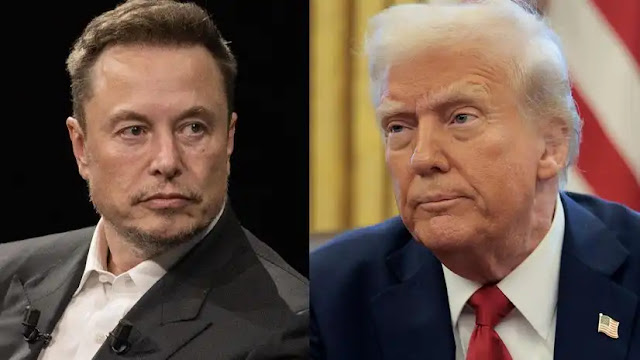President Donald Trump is reiterating his threat to remove billionaire Elon Musk’s federal subsidies as the two renew their feud over the Republican megabill currently in the Senate.
“Elon may get more subsidy than any human being in history, by far, and without subsidies, Elon would probably have to close up shop and head back home to South Africa,” Trump posted on Truth Social Tuesday morning.
“No more Rocket launches, Satellites, or Electric Car Production, and our Country would save a FORTUNE. Perhaps we should have DOGE take a good, hard, look at this?”
Asked by a reporter on the White House lawn Monday morning whether he’d consider having Musk deported, Trump said, “I don’t know. We’ll have to take a look.”
Musk is a naturalized U.S. citizen.
Two of Musk’s companies, electric vehicle maker Tesla and space technology company SpaceX, rely heavily on government subsidies and contracts for their businesses. Both are at the forefront of innovation in their respective industries and together they make up a substantial amount of Musk’s overall wealth.
Musk, one of the Republican Party’s largest donors in 2024, is strongly opposed to the GOP’s mammoth tax and spending package, and now believes lawmakers should lose primary challenges for supporting it.
Musk has posted repeatedly on X about his issues with the “big, beautiful” budget reconciliation bill making its way through the GOP-controlled Senate. On Monday, Musk suggested he would get involved with primary challenges against lawmakers who vote for the spending bill and even floated starting a third party under the label the “America Party” to push out Trump and his followers.
“Every member of Congress who campaigned on reducing government spending and then immediately voted for the biggest debt increase in history should hang their head in shame!” Musk posted on X, the social media platform he owns.
“And they will lose their primary next year if it is the last thing I do on this Earth.”
With his $409.8 billion net worth, Musk could pour money into GOP primary candidates if he chooses to get involved with the 2026 midterms. Musk previously said he would cut back political spending because he did not see a reason for it after he spent hundreds of millions of dollars helping President Trump win the 2024 election. He later posted about donating to libertarian Representative Thomas Massie (R., Ky.), who has emerged as a leading Republican Trump critic. Trump and his allied have already vowed to primary Massie because of his opposition to the scale of spending included in Trump’s domestic agenda, as well as the president’s embrace of a more assertive foreign policy.
The GOP megabill’s impact on the deficit sparked the deeply personal, dramatic online feud between Trump and Musk that played out in early June following Musk’s departure from the Trump administration. He later deleted his inflammatory posts about Trump and expressed regret over some of his attacks towards the president. When the two were feuding, Trump had similarly threatened to take a look at the government subsidies Musk’s companies receive.
Musk helped lead the Department of Government Efficiency during his 130-day tenure in Washington and became a top advisor to Trump over that time period. DOGE led the way in dismantling the U.S. Agency for International Development and has attempted to cut wasteful spending and fraud at other federal agencies.
Over the weekend, Musk renewed his criticism of the Trump-backed megabill because of its projected impact on the national debt and provisions to phase out green energy tax credits.
“The latest Senate draft bill will destroy millions of jobs in America and cause immense strategic harm to our country! Utterly insane and destructive. It gives handouts to industries of the past while severely damaging industries of the future,” Musk said Saturday.
Musk also shared negative polling data on the GOP legislation and claimed it is “political suicide” for the party.
The Congressional Budget Office’s most recent estimate of the Senate version of the bill found that it would add $3.3 trillion to the deficit over ten years, a lower figure than Musk’s $5 trillion forecast.
Critics of the CBO method have disputed its assumption that the 2017 Trump tax cuts would expire at the end of the year, even though the main purpose of the “big, beautiful” bill is to make them permanent. With an alternative method called the “current policy baseline,” the GOP budget bill is projected to have a substantially reduced impact on the deficit.
Musk’s previous criticisms have not impacted Trump’s full throated support for the GOP spending package or the congressional GOP’s push to get it over the finish line. Trump wants the bill on his desk by July 4th and the Senate is set to vote on its passage this week and potentially send it back to the House.














